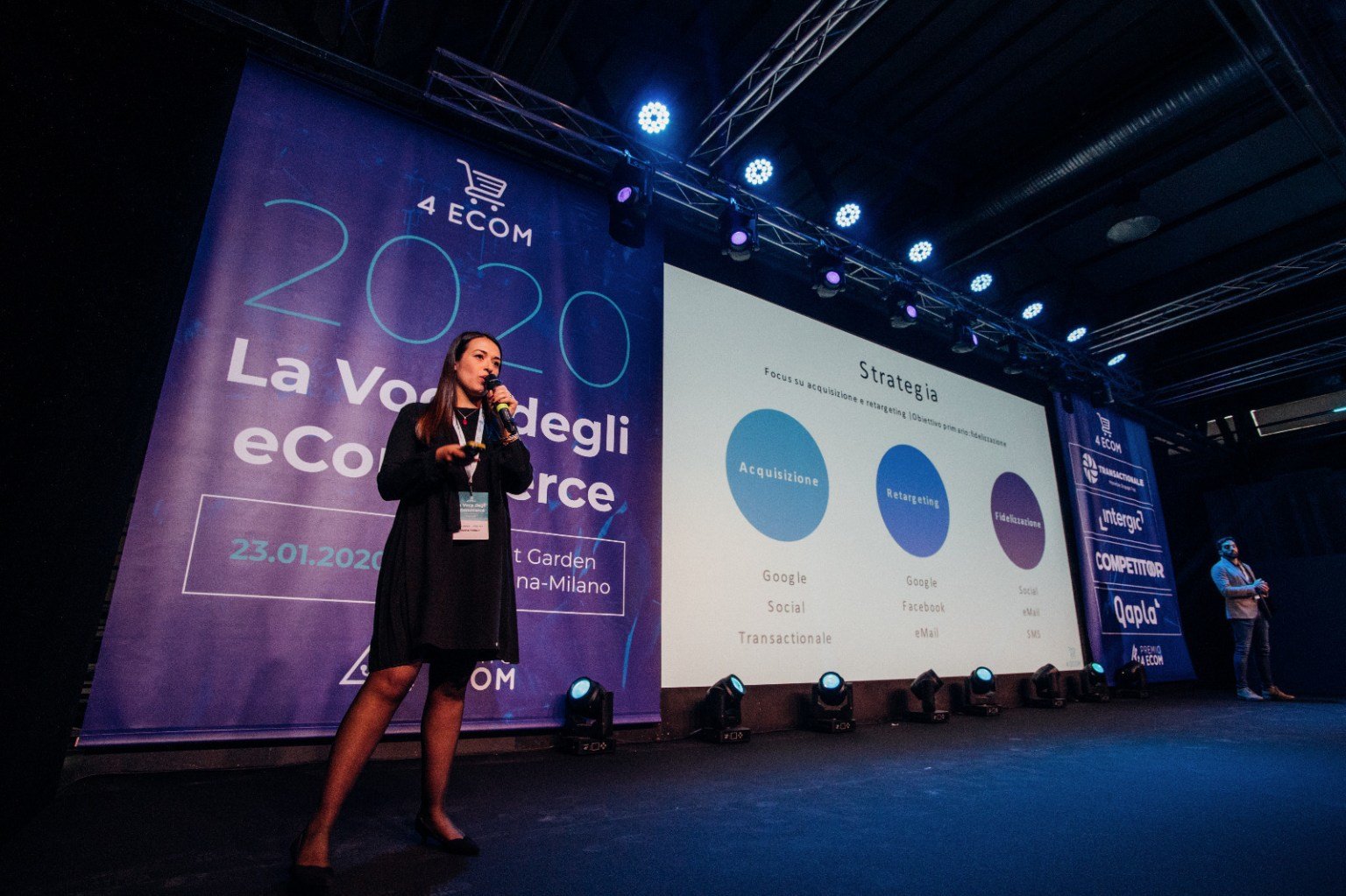
Transactionale is a lead generation and direct marketing platform, which allows two or more non-competing eCommerce sites to activate co-marketing campaigns immediately after a user makes a purchase on one of the eCommerce sites of the network.
>Share this post<
by kooomo
July 01, 2020
This week on “Stories of resilient companies” we’re getting yo know one of Kooomo’s partners. Transactionale is a lead generation and direct marketing platform, which allows two or more non-competing eCommerce sites to activate co-marketing campaigns immediately after a user makes a purchase on one of the eCommerce sites of the network. Despite the forced lockdown, the company recorded an exponential growth of its network by reacting with a lot of creativity and resilience.
Marianna Chillau brought us behind the scenes of their reality and gave us a contribution – both as CEO & Co-founder of Transactionale and as a consultant to various entrepreneurs belonging to their network. On their network, she has been able to observe trends and metamorphoses differentiated by product categories and business models.
“At Transactionale, we supported our customers through the lockdown period on two fronts. Firstly, with content training, provided free of charge through webinars – helping our network to overcome the emergency, sharing ideas and useful strategies to respond to the new needs of the market. We also decided to reinvest a part of our earnings to promote the eCommerce sites on the Transactionale network. We created a dedicated space where our customers share their offers, providing this additional service at no cost.
The new Transactionale channel has a twofold objective: a) to reward the customers of the Network and b) to promote the relaunch of Made in Italy and Italian eCommerce. In fact, a dedicated Facebook page for “Offers by Transactionale” was created – widening the possibility for consumers to access the best offers in the Pharma, Electronic, Fashion and other sectors. “
Marianna also discussed how the companies in the Transactionale network reacted to new consumer buying habits, outlining different action plans according to the product category and business model.
“The beginning of the lockdown has seen many scenarios change in terms of consumers’ purchasing habits. For example, those who had never purchased online decided to take the first step. As well as that, you have eCommerce divided into two categories: those that sold without marketing (especially in the food & pharma sectors) and those that despite marketing have struggled to stand up (clothing, accessories, etc.). The emergency has helped to redesign the landscape of the retail industry, making us take a leap forward in the adoption of some technologies, which without the pandemic we may not have seen emerging for another 5 years.
Marianna Chillau brought us behind the scenes of their reality and gave us a contribution – both as CEO & Co-founder of Transactionale and as a consultant to various entrepreneurs belonging to their network. On their network, she has been able to observe trends and metamorphoses differentiated by product categories and business models.
“At Transactionale, we supported our customers through the lockdown period on two fronts. Firstly, with content training, provided free of charge through webinars – helping our network to overcome the emergency, sharing ideas and useful strategies to respond to the new needs of the market. We also decided to reinvest a part of our earnings to promote the eCommerce sites on the Transactionale network. We created a dedicated space where our customers share their offers, providing this additional service at no cost.
The new Transactionale channel has a twofold objective: a) to reward the customers of the Network and b) to promote the relaunch of Made in Italy and Italian eCommerce. In fact, a dedicated Facebook page for “Offers by Transactionale” was created – widening the possibility for consumers to access the best offers in the Pharma, Electronic, Fashion and other sectors. “
Marianna also discussed how the companies in the Transactionale network reacted to new consumer buying habits, outlining different action plans according to the product category and business model.
“The beginning of the lockdown has seen many scenarios change in terms of consumers’ purchasing habits. For example, those who had never purchased online decided to take the first step. As well as that, you have eCommerce divided into two categories: those that sold without marketing (especially in the food & pharma sectors) and those that despite marketing have struggled to stand up (clothing, accessories, etc.). The emergency has helped to redesign the landscape of the retail industry, making us take a leap forward in the adoption of some technologies, which without the pandemic we may not have seen emerging for another 5 years.
Even the action plans – adds Marianna – were totally different depending on the type of product sold and the adaptability of the company’s production processes. Those who saw increased orders in the weeks of the quarantine had to organise themselves to cope with a long-term “Black Friday” effect. They increased the staff mainly in pre and post-sales management and tried to make order reception more efficient (for example, increasing the minimum cart threshold for purchase). The less fortunate eCommerce sites (in the sectors not connected to basic necessities), organised themselves in order to limit the losses, increasing the points of contact with the consumer (for example by adding a presence in some marketplaces) and changing their tone of voice on social networks with more “emotional” content. There are those who even modified their catalogue with scarce products such as from gel to masks. “
During the multiple webinars that Marianna organised throughout the COVID19 period, trends, technologies and habits in Asian markets were discovered that could also contribute to the acceleration of the development of Made in Italy. The union between eCommerce and entertainment is certainly a distant characteristic of the Chinese market – where for a couple of decades, new sales methods and approaches to trade have been developing which European companies are also starting to look at with interest.
“In this period, I personally encouraged the idea of “Live Streaming”, which in China has more than 10% of the total online turnover – and will soon be an established trend in Europe too. We talked about it in some of our webinars involving experts from the Chinese market (such as Marco Gervasi and Andrea Fenn), who told us how live sales have become a real entertainment channel for the Chinese – comparable to watching content on Netflix for us Westerners. I must admit that an interesting scenario has opened which will bring tangible results to those who will be able to seize this opportunity. It is a new sales channel that allows the personal assistant to place itself on the same level as the consumer, to make the latter identify in the product that is being offered to him, with high possibilities of “conversion”.
Live Streaming accounted for nearly 9% of total sales in China, worth about $ 63 billion in 2019.
Many platforms, including Taobao, daily host over 4,000 Live Streaming hosts who present and test products for consumers, who can interact with the presenter and buy directly, during the broadcast.
Adopting digital personal assistant strategies for the sale of Made in Italy products can create a performing touch-point, capable of accelerating not only the economic recovery but also the internalisation of companies.
See you next story! Stay tuned.
Jennifer Puzzo, Head of Client Service of Italy
During the multiple webinars that Marianna organised throughout the COVID19 period, trends, technologies and habits in Asian markets were discovered that could also contribute to the acceleration of the development of Made in Italy. The union between eCommerce and entertainment is certainly a distant characteristic of the Chinese market – where for a couple of decades, new sales methods and approaches to trade have been developing which European companies are also starting to look at with interest.
“In this period, I personally encouraged the idea of “Live Streaming”, which in China has more than 10% of the total online turnover – and will soon be an established trend in Europe too. We talked about it in some of our webinars involving experts from the Chinese market (such as Marco Gervasi and Andrea Fenn), who told us how live sales have become a real entertainment channel for the Chinese – comparable to watching content on Netflix for us Westerners. I must admit that an interesting scenario has opened which will bring tangible results to those who will be able to seize this opportunity. It is a new sales channel that allows the personal assistant to place itself on the same level as the consumer, to make the latter identify in the product that is being offered to him, with high possibilities of “conversion”.
Live Streaming accounted for nearly 9% of total sales in China, worth about $ 63 billion in 2019.
Many platforms, including Taobao, daily host over 4,000 Live Streaming hosts who present and test products for consumers, who can interact with the presenter and buy directly, during the broadcast.
Adopting digital personal assistant strategies for the sale of Made in Italy products can create a performing touch-point, capable of accelerating not only the economic recovery but also the internalisation of companies.
See you next story! Stay tuned.
Jennifer Puzzo, Head of Client Service of Italy
More to explore
Here’s an overview of the latest improvements that are now available in the Kooomo platform.
In the next few years, we are foreseeing an impressive increase for the global retail industry. While this can be beneficial for the global eCommerce industry, it also means that there will be more competition, as well.

 en
en 

